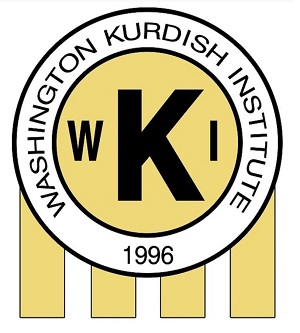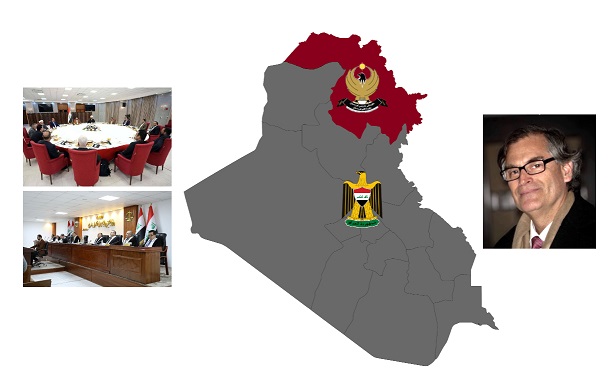By: Vincent Campos | April 6, 2024
Synopsis: The political power sharing concept of Muhasasa along ethnosectarian lines has long been rebuked and criticized by Iraq analysts and political pundits as a main source of sociopolitical conflict and division while at the same time being blamed for the rampant corruption that permeated throughout Iraq for the past two decades. However, the absence of the safeguard that Muhasasa provides vis-à-vis wider political inclusion has invited unchecked political dominance and rising authoritarianism by a Shia-dominated majority that has emerged in Iraq. The Tehran influenced central government in Baghdad is precisely the antithesis to Muhasasa and poses an even greater threat to Kurdistan’s security and economic development.
Origins of Modern Muhasasa in Iraq
Since 2003, the concept of Muhasasa has been reviled, maligned, and blamed for Iraq’s political inadequacies and conflicts. Opinions by Iraq analysts and political pundits have changed little during the past two decades irrespective of governance dysfunction by the leaders of Baghdad’s majority political parties in which Muhasasa has played a minimal role. At the same time, the alternative to Muhasasa is immeasurably worse as currently seen developing with the dominance by the Coalition Framework.
The matter of an ethnosectarian Iraq, however, is not new. The modern nation-state of Iraq, since its inception in 1921, has had to deal with a triangular ethnosectarian power struggle between the country’s three principal communal groups: Shia, Sunnis and Kurds, largely gathered in the southern, central and northern parts of the country, respectively.
Although the fundamental concept of Muhasasa (referred to as Al Muhasasa Al Ta’ifia in some academic circles) has existed for several years, Iraq’s latest iteration can be traced to a meeting that took place in London in December 2002 among several Shia, Sunni and Kurdish leaders who were intent on putting the “new” Iraq on a path that could prevent the return of authoritarian rule by the central government in Baghdad. The consensus at the meeting agreed to an ethnosectarian power sharing arrangement which would ensure that Shias, Sunnis, Kurds, and minority groups would be guaranteed an opportunity to participate in governing a modern Iraq.
Three key positions emerged from this consensus: a Shia Prime Minister, a Kurdish President, and a Sunni Speaker of the Parliament. As Muhasasa took shape, additional government positions were added to the list, including the position of Foreign Minister which has since been occupied by experienced and widely respected Kurdish statesmen.
Of note, a much earlier version of Muhasasa had actually been proposed in 1992 in response to Saddam Hussein’s brutal chemical attack on the Kurdish people and tortuous regime throughout Iraq. The participants of that meeting vowed not to allow Iraq to remain under dictatorial control. As such, the fundamental intent of modern Muhasasa was to prevent any attempts to return to a pre-2003 authoritarian style central government in Iraq.
No Limit to Critics and Detractors of Muhasasa
The concept of Muhasasa has been criticized and derided since its inception by intellectuals and political pundits both inside and especially outside of Iraq including from leading Washington DC-based think tanks. In 2019, an Iraqi-American expert opined that Muhasasa resulted in a lack of national unity across Iraq, furthering foreign intervention in Iraq’s internal affairs. He added that Muhasasa led directly to the lack of checks and balances to hold people in power accountable.
Additionally, a UN attorney with several years of experience with Iraqi political development expressed his rejection of Muhasasa, claiming that the 2005 Iraq Constitution was flawed by design in that Muhasasa was implied but not expressly mentioned throughout the text. He also made comparisons with Lebanon’s own ill-fated experience. But as history has clearly shown, Lebanon’s Muhasasa record was immeasurable more complicated and complex on several levels as most comparisons with Iraq are largely inaccurate with only few areas in common.
Still, the intent behind Muhasasa does not sit well with the Coalition Framework which has taken a number of steps to minimize Muhasasa at the expense of co-opting Iraq’s political landscape to further entrench itself as the leading central government authority. For their part, the Tishreen protest movement even seized upon anti-Muhasasa sentiments as the bane for Iraq’s political ills.
Muhasasa Blamed as Iraq’s Source of Corruption?
This form of ethnosectarian power sharing has also been widely blamed for corruption and weak governance within modern Iraq. Since the start of Iraq’s permanent government in 2006, Transparency International has rated Iraq as one of the most corrupt countries in the world.
Curiously, Iraq’s rating during Nouri al-Maliki’s tenure as Prime Minister consistently placed Iraq in the “bottom ten” worldwide. Iraq’s position has not improved significantly over the years, and still remains firmly among the lowest rated 30 countries. Despite promises by Iraqi leadership expressing intent to confront these issues, both corruption and the insidious kleptocracy remain a significant concern without any corrective action by the central government. Along those lines, the creation of the Muhandis General Company all but guarantees nearly unlimited government funds to fill the Popular Mobilization Forces coffers, something now akin to institutionalized corruption.
Federal Supreme Court as an Active Accomplice
Following more than ten rulings against the Kurdistan Region in recent years, Kurdish judge Abdulrahman Sulaiman recently resigned from the Federal Supreme Court (FSC), citing his decision due to the court’s consecutive rulings “to return to central authority and move away from federal principles.” He expressed frustration at being unable to defend the entity of the Kurdistan Region within the framework of the Iraqi constitution.
Earlier this year, the court ruled on two key issues regarding payments to Kurdistan public servants and the requirement for the Kurdistan Regional Government (KRG) to send all oil and non-oil revenues to Baghdad, further highlighting the court’s alignment with the central government to the detriment of Kurdistan. Since 2022, the previously mentioned ten verdicts against Kurdistan included significant rulings such as halting Kurdish oil production, annulling Kurdistan’s parliament, and altering election laws to diminish the authority KRG over the region.
The diminished Muhasasa power-sharing has allowed the FSC to function more like an instrument of the central government rather than a respected institution of judicial balance and fairness.
An Eroded Muhasasa Enables Baghdad and Marginalizes Kurdistan
The detrimental impact of Shia-led governments have been clearly manifested in Baghdad’s longstanding failure to fully support and advocate complete implementation the 2005 Iraqi Constitution with virtually no prospects of that trend changing in the foreseeable future. The expectations for Muhasasa to contribute to a more responsible and representative government have not materialized, primarily due to the dominant majority rule. The rise of Coalition Framework influence does not offer optimism for a change.
Without Muhasasa as a reliable counterbalance, the impact of the central government’s policies on energy sector development has strangled Kurdistan’s economy and by default impacts all of Iraq. On the issue of oil exports, each day that the pipeline from Kurdistan to Turkey remains closed results in estimated revenue losses of approximately $1 billion each month. Regrettably, since March of 2023, Kurdistan has delivered 11 million oil barrels to Baghdad but had not received “a single dinar” in return. Similarly, the massive potential for Kurdistan’s natural gas production, estimated at 20 percent of Iraq’s total reserves, remains micromanaged by Baghdad
Prognosis: Challenges, Hurdles, and Opportunities
Contrary to some popular opinions, Iraq’s lack of a “National Identity” is not a result of Muhasasa but rather the lack of political will primarily by leaders in Baghdad. Acknowledging a National Identity while simultaneously recognizing Iraq’s ethnosectarian nature are not mutually exclusive actions but rather should be considered mutually inclusive and necessary concepts that must coexist. As such, Muhasasa in the Iraqi context must play a viable role to enhance governance balance and fairness while also enhancing sociopolitical awareness and inclusion.
For nearly 20 years, the lack of political will to earnestly address pending actions in support of the 2005 Iraqi Constitution has directly imperiled Kurdistan’s development. During his recent visit to Washington DC, KRG Prime Minister Masrour Barzani stressed to U.S. Senator Nancy Pelosi the vital imperative for “implementing the Iraqi constitution to guarantee the constitutional rights of the Kurdish people and protect and respect the constitutional and federal entity of the Region.” Arriving to a remedy is long overdue and would have a significant impact on Erbil-Baghdad relations, coincidentally a priority discussion topic in the impending meeting scheduled for April 15 between President Biden and Prime Minister Sudani.
Ultimately, the absence of Muhasasa would unfortunately allow for the creation of a widely feared power sharing vacuum, the result of which could effectively pave the way for an unabated return of an authoritarian central government. Accordingly, authentic power sharing must remain a functional imperative in Iraq as opposed to the alternative “majority rule” power regime that has developed as the current trend. Politically, both Sunnis and Kurds cannot be treated as “power sharing opponents” and must not be further marginalized by the Coalition Framework. In that sense, Muhasasa is truly the last line of defense to fend off the rise of authoritarianism.
Partnership, and not animosity, must be the guiding principle that is fundamental to creating productive and impactful Erbil-Baghdad relations as a federalism mandate and in the spirit of Muhasasa.
If, unfortunately, the political landscape is derailed and manipulated by the ruling majority, the result cannot evolve into a “worst case scenario” where Kurdistan effectively becomes a vassal state of the central government in Baghdad.
Disclaimer: The views expressed here represent those of the author and not necessarily those of the WKI.


